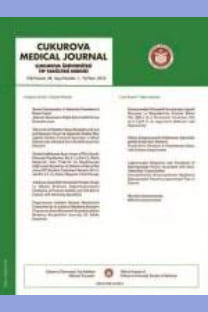Obezite ile yeme davranışı, beden algısı ve benlik saygısı arasındaki ilişki
Obezite, yeme davranışı, beden algısı
The relationship between obesity and eating behavior, body image and self-esteem
Obesity eating behavior, body image, self-esteem,
___
- 1. World Health Organization (WHO), 2015. Obesity and overweight. Erişim adresi: http://www.who.int/mediacentre/factsheets/fs311/ en/. Erişim tarihi:12.04.2018
- 2. Satman İ, Yılmaz T, Şengül A. Population-based study of diabetes and risk characteristics in Turkey: results of the Turkish Diabetes Epidemiology Study (TURDEP). Diabetes Care. 2002;25:1551-6.
- 3. Satman I, Omer B, Tutuncu Y, et al. Twelve year trends in the prevalence and risk factors of diabetes and prediabetes in Turkish adults. Eur J Epidemiol. 2013;28:169-80.
- 4. Eren İ, Erdi Ö. Obez hastalarda psikiyatrik bozuklukların sıklığı. Klinik Psikiyatri Dergisi. 2003;6:152-7.
- 5. Pınar R. Obezlerde depresyon, benlik saygısı ve beden imajı: karşılaştırmalı bir çalışma. C.Ü. Hemşirelik Yüksekokulu Dergisi. 2002;6:30-41.
- 6. Deveci A, Demet M, Özmen B, Özmen E, Hekimsoy Z. Obez hastalarda psikopatoloji, aleksitimi ve benlik saygısı. Anadolu Psikiyatri Derg. 2005;6:84-91.
- 7. Werrij MQ, Mulkens S, Hospers HJ, Jansen A. Overweight and obesity: the significance of a depressed mood. Patient Educ Couns.2006;62:126- 31.
- 8. Değirmenci T, Kalkan Oğuzhanoğlu N, Sözeri Varma G, Özdel O. Obezitede psikolojik belirtiler ve ilişkili etmenler. Noro Psikiyatrri Ars. 2015;52:42-6.
- 9. Ozmen D, Ozmen E, Ergin D, Cetinkaya AC, Sen N, Dundar PE et al. The association of self-esteem, depression and body satisfaction with obesity among Turkish adolescents. BMC Public Health. 2007;7:80.
- 10. Mikolajczyk RT, Maxwell AE, Ansari WE, Stock C, Petkeviciene J, Guillen-Grima P. Relationship between body mass index and self-perception among university students: a cross-sectional study in seven European countries. BMC Public Health. 2010;10:40.
- 11. WHO. Prevention and Management of the Global Epidemic of Obesity. Report of the WHO consultation on Obesity. Geneva, WHO, 2001.
- 12. Van Strien T, Frijters JER, Bergers GPA, Defares PB. The Dutch eating behavior questionnaire (DEBQ) for assessment of restrained, emotional, and external eating behavior. Int J Eat Disord. 1986;5:295-315.
- 13. Bozan N, Bas M, Asci FH. Psychometric properties of Turkish version of Dutch Eating Behaviour Questionnaire (DEBQ). A preliminary results. Appetite. 2011;56:564–6.
- 14. Hovardaoğlu S .Vücut algısı ölçeğinin güvenirlik ve geçerlik çalışması. İçinde: Özdemir YD. Şizofrenik ve majör depresif hastaların beden imgelerinden doyum düzeyleri(Yüksek lisans tezi), Ankara ,Ankara Üniveersitesi. 1990.
- 15. Çuhadaroğlu F. Adolesanlarda benlik saygısı (Uzmanlık tezi). Ankara, Hacettepe Üniversitesi, 1986.
- 16. Puraikalan Y. Obesity: Perceptions of body image and obesity among cross culture: A Review. Obes Res Open J. 2018;5(1):1-4.
- 17. Snoek HM, van Strien T, Janssens JMAM ve Engels RCME. Emotional, external, restrained eating and overweight in Dutch adolescents. Scand J Psychol. 2007;48:23-32.
- 18. 18.Snoek HM, van Strien T, Janssens JMAM ve Engels RCME. Restrained eating and BMI: A longitudinal study among adolescents. Health Psychol. 2008;27:753-9.
- 19. Heatherton TF, Polivy J ve Herman CP. Dietary restraint: Some current findings and speculations. Psychol Addict Behav.1990;4:100-6.
- 20. 20.Van Strien T ve Ouwens MA. Counterregulation in female obese emotional eaters: Schachter, Goldman, and Gordon's (1968) test of psychosomatic theory revisited. Eat Behav. 2003;3:329-40.
- 21. Cools J, Schotte DE ve McNally RJ. Emotional arousal and overeating in restrained eaters. J Abnorm Psychol.1992;101:348-51.
- 22. Macht M. How emotions affect eating: A five-way model. Appetite. 2008;50:1-11.
- 23. Nisbett RE. Determinants of food intake in obesity. Science. 1968;159:1254-5.
- 24. Schachter S. Obesity and eating. Science. 1968;161:751-6.
- 25. Bouchard C.The Genetics of Obesity. Philadelphia, CRC Press. 1994;245.
- 26. Flatt JP. Importance of nutrient balance in body weight regulation. Diabetes Metab Rev. 1988;4:571- 81.
- 27. Kopelman PG, Finer N, Fox KR, Hill A, MacDonald IA. ASO consensus statement on obesity. UK Association for the Study of Obesity. Int J Obes Relat Metab Disord. 1994;18:189-91.
- 28. Kim O, Kim K. Body weight, self-esteem and depression in Korean female adolescents. Adolescence .2001;36:315- 22.
- 29. Gortmaker SL, Must A, Perrin JM, Sobol AM, Diez WH. Social and economic concequences of overweight in adolescence and young adulthood. N Engl J Med. 1993;329:1008-12.
- 30. Bryan J, Tiggemann M. The effect of weight-loss dieting on cognitive performance and psychological well-being in overweight women. Appetite. 2001;36:147-56.
- 31. Bal Ö, Özgür G, Gümüş AB. Obez bireylerde stresle başa çıkma yöntemleri. C.Ü. .Hemşirelik Yüksekokulu Dergisi 2006;10(3):20-8.
- 32. Cash TF. Body image and weight changes in a multisite comprehensive very low calorie diet program. Behav Ther. 1994;25:239-54.
- 33. Sarwer DB, Wadden TA, Foster GD. Assessment of body image dissatisfaction in obese women: Specificity, severity and clinical significance. J Consult Clin Psychol. 1998;7:101-4.
- 34. Tezcan B. Obez bireylerde benlik saygısı, beden algısı ve travmatik geçmiş yaşantılar (Uzmanlık tezi). İstanbul, Bakırköy Ruh ve Sinir Hastalıkları Hastanesi, 2009.
- 35. Park B, Cho HN, Choi E, Seo DH, Kim S, Park YR et al.. Self-perceptions of body weight status according to age-groups among Korean women: A nationwide population-based survey. PloS One. 2019;14:e0210486.
- ISSN: 2602-3032
- Yayın Aralığı: Yılda 4 Sayı
- Başlangıç: 1976
- Yayıncı: Çukurova Üniversitesi Tıp Fakültesi
Ahmet ATICI, Nursel DİKMEN, Mehmet Emin ÇELİKKAYA, Çiğdem EL, Bülent AKÇORA
Ayla Uzun Çiçek, Emine Çığıl Fettahoğlu, Esin Özatalay, Seda Aybüke Sarı
İnsan parechoviruslarının özellikleri, epidemiyolojisi ve klinik önemi
Akut graft versus host hastalığında santral sinir sistemi tutulumu
Bir üniversite hastanesinin yoğun bakım ünitelerinde maliyet analizi
İskender KARA, İnci KARA, Yeşim Şerife BAYRAKTAR, Faruk ÇİÇEKCİ, Hüseyin YILMAZ, Ateş DUMAN, Jale Bengi ÇELİK
Hasta Katılımı Ölçeği: Kronik hastalığı olan hastalarda Türkçe geçerlik ve güvenirlik çalışması
Dilara USTA, Fatoş KORKMAZ, İmatullah AKYAR, Andrea BONANOMİ
Karabük'te kendi kendine meme muayene sıklığı ve belirleyicileri
Hemşirelik öğrencilerinin ahlaki duyarlılıklarının profesyonellik tutum düzeylerine etkisi
Zehra GÖÇMEN BAYKARA, Ceyda Su GÜNDÜZ, Gülcan EYÜBOĞLU
Bel ağrısında pulsed ve konvansiyonel radyofrekans termokoagulasyon uygulamaları
